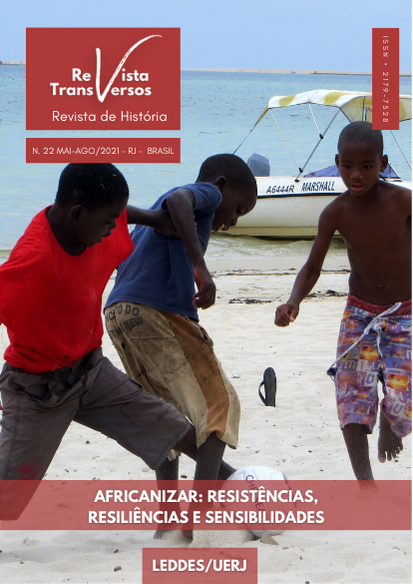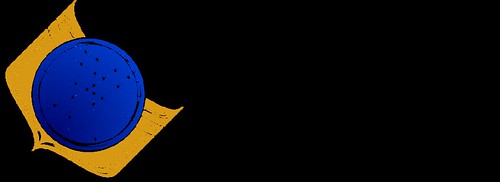Diamantes de sangue e excrementos do diabo: análise dos efeitos do discurso da maldição de recursos naturais na África
DOI:
https://doi.org/10.12957/transversos.2021.58330Palavras-chave:
HistóriaResumo
Os recursos naturais dos países em desenvolvimento têm má fama, (os diamantes são de sangue e o petróleo são excrementos do diabo) esta parece ser a conclusão mais óbvia e consentânea com os insights produzidos pela abundante literatura sobre maldição de recursos naturais nascida do estudo seminal de Richard Auty. Estudioso que não só pavimentou o caminho seguido pela crescente literatura do resource curse e sua derivada presource curse, como também introduziu uma perspectiva maniqueísta na análise do contributo econômico da exploração de recursos naturais, atualmente vista como benção ou maldição. Pelo itinerário metodológico que partiu da ontologia do realismo crítico e combinou a epistemologia pós-colonial e o método da análise do discurso crítica, procurou-se responder: quais são as relações de poder subjacentes ao discurso de maldição de recursos e, como é que os países africanos reagem aos efeitos da sua reprodução. Concluiu-se apontando a ação de uma “frente académica”, a revisão do quadro institucional, dos contratos comerciais, o surgimento de partidos políticos que reivindicam a nacionalização dos recursos e a emergência de movimentos de ocupação de terras como estratégias de retoma da soberania sobre os recursos e contenção de sua hemorragia.
Referências
AUTY, R. Sustaining development in mineral economies: The resource curse thesis. London: Routledge, 1993.
BANERJEE, Subhabrata Bobby. Necrocapitalism. Organization Studies, 29(12), 1541–1563, 2008. https://doi.org/10.1177/0170840607096386
BANERJEE, Subhabrata Bobby. Who Sustains Whose Development? Sustainable Development and the Reinvention of Nature. Organization Studies, 24(1), 143–180, 2003.
BANERJEE, Subhabrata Bobby; PRASAD, Anshuman. Introduction to the special issue on “Critical reflections on management and organizations: a postcolonial perspective”, critical perspectives on international business, v. 4 No. 2/3, pp. 90-98, 2008.
BAYART, Jean-François. L’Afrique dans le monde : une histoire d’extraversion. Critique Internationale, 5(5), 97–120, 1999. https://doi.org/10.3406/criti.1999.1505
BELLUCCI, Belle. Fome de África: terra e investimento agrícola no continente africano. Revista Tempo Do Mundo, 4(1), 79–119, 2012.
BRESSER-PEREIRA, Luiz. C; CRISTINA, Eliane; COSTA, Samuel. An alternative to the middle-income trap. Structural Change and Economic Dynamics, 52, 294–312. 2020. https://doi.org/10.1016/j.strueco.2019.11.007
BUSSOTTI, Luca. Análise da cobertura de imprensa risco ambiental de Moçambique O caso da Mozal Bypass e Jornal “Notícias” e “O país.” Revista Luciérnaga, 5(10), 15–27, 2013.
CAHEN, Michael. Em Moçambique só há partidos de direita. Revista Plural. São Paulo, v.20. p.155‑174, 2013
CARMODY, Pádraig. The new scramble for Africa. Cambridge, MA: Polity Press, 2011.
CASTEL-BRANCO, Carlos. Nuno. Lógica histórica do modelo de acumulação de capital em Moçambique. In BRITO, Luis de; CASTEL-BRANCO, Carlos; CHICHAVA, Sérgio; Francisco, António (Ed.), Desafios para Moçambique 2017 (pp. 257–302). Maputo: IESE, 2017.
COLLIER, Paul. The profits of boom: Will Africa manage them differently this time? Optima, 54, 2–7, 2008.
CUST, James; Mihalyi, David. Evidence for a Presource Curse? In Policy Research Working Paper (No. 8140), 2017.
CHANG, Ha-Joon. How to do a developmental state: political, organisational and human resource requirements for the developmental state. In EDIGHEJI, O. (ed). Constructing a Democratic Developmental State in South Africa Potentials and Challenges. Capetown: HSRC Press, 2010.
DAVIS, Graham. A., & TILTON, John. E. Why the resource curse is a concern. Mining Engineering, 60(4), 29–32, 2008.
DUFFY, Rosaleen. The potential and pitfalls of global environmental governance: The politics of transfrontier conservation areas in Southern Africa. Political Geography, 25(1), 89–112, 2006. doi:10.1016/j.polgeo.2005.08.001
ESCOBAR, Arturo. (1988) Power and Visibility: Development and the Invention and Management of the Third World. Cultural Anthropology , Nov., 1988, V. 3, No. 4 (Nov., 1988), pp. 428-443
FAIRCLOUGH, Norman; JESSOP, Bob; SAYER, Andrew. Critical Realism and Semiosis. Alethia, 5(1), 2–10, 2002. https://doi.org/10.1558/aleth.v5i1.2
FAIRCLOUGH, Norman. Análise crítica do discurso como método em pesquisa social científica. Linha D´Água, 25(2), 307–329, 2012.
FASE. (2016). A cooperação Sul-Sul dos povos do Brasil e de Moçambique.
FERGUSON, James. Expectations of modernity. Myths and meanings of urban life on the Zambian Copperbelt. Berkeley, CA: University of California Press, 1999.
FLEETWOOD, Steve. Ontology in organization and management studies: A critical realist perspective. Organization, 12:2, 197–222, 2005.
FLETCHER, Amber. J. Applying critical realism in qualitative research : methodology meets method. International Journal of Social Research Methodology, 20(2), 181–194, 2017. FRYNAS, Jedrzej George; WOOD, Geoffrey.; HINKS, Timothy. The resource curse without natural resources: Expectations of resource booms and their impact. African Affairs, 116(463), 233–260, 2017. GILBERTHORPE, Emma. & RAJAK, Dinah. The Anthropology of Extraction: Critical Perspectives on the Resource Curse. The Journal of Development Studies, 2016. DOI: 10.1080/00220388.2016.1160064
HICKS, Celeste. Africa’s new oil: Power, pipelines and future fortunes. London: Zed Books, 2015.
KIRSCH, Stuart. Mining capitalism: The relationship between corporations and their critics. Berkeley, CA: Stanford University Press, 2014.
KUWIMB, Mako. A critical study of the resource curse thesis and the experience of Papua New Guinea. James Cook University, 2010.
LAYRARGUES, Philippe Pomier Do ecodesenvolvimento ao desenvolvimento sustentável: evolução de um conceito. Proposta, 25(71), 5–10, 1997.
LEE, M. C. Trade relations between the European Union and Sub-Saharan Africa under the Cotonou Agreement: Repartitioning and economically recolonizing the continent? In R. Southall & H. Melber (Eds.), A new scramble for Africa: Imperialism, investment and development (pp. 83–111). Scottsville, SA: University of KwaZulu-Natal Press, 2009.
LOPES, Carlos. Africa in Transformation : Economic Development in the Age of Doubt. Palgrave Macmillan, 2019.
MAILEY, J. R. A anatomia da maldição dos recursos: Investimento predatório nas indústrias extrativas de África. In Centro de Estudos Estratégicos Africanos (Vol. 3), 2015.
MENESES, Maria. Paula. G. O “indígena” africano e o colono “europeu”: a construção da diferença por processos legais. E-Cadernos CES, 07, 2010.
MINDOSO, André Victorino. Na encruzilhada entre “emancipação” e dominação: a narrativa ambientalista global e as políticas desenvolvimentistas de África. Civitas - Revista de Ciências Sociais, 20(2), 144–153, 2020. MKANDAWIRE, Thandika.;SOLUDO, Charles. C. Our continent our future African Perspectives on Structural Adjustment. Dakar: CODESRIA, 1998.
MKANDAWIRE, Thandika; SOLUDO, Charles. C. African Voices On Structural Adjustment. (ed.) CODESRIA, 2003.
MOYO, Sam; YEROS, Paris. Ocupaciones de tierras y reforma agraria en Zimbabwe: hacia la revolución democrática nacional. CLACSO, 2008.
NASCIMENTO, AugustoReclamar o futuro … Notas sobre a 13 . a Assembleia do CODESRIA. Africana Studia, 17, 285–299, 2011
NEGRÃO, José A indispensável terra africana para o aumento da riqueza dos pobres 1–21, 2002.
OXFAM.. Da Aspiração à realidade Análise da Visão Africana para o sector da Mineração. Vol. Março, 2017
PAMPLONA, João. Baptista., & CACCIAMALI, Maria Cristina A maldição dos recursos naturais: atualizando, organizando e interpretando o debate. Economia e Sociedade, 27(1), 129–159, 2018 PRADA, Valentín R. Vázquez De La conferencia de Estocolmo sobre el medio ambiente. Revista de Administracion Publica, 26, 381–401, 1972
PRASAD, Anshuman. Postcolonial Theory and Organizational Analysis: A Critical Engagement. New York, NY: Palgrave Macmillan, 2003
PRICHARD, Wilson The mining boom in Sub-Saharan Africa: Continuity, change and policy implications. In R. Southall & H. Melber (Eds.), A new scramble for Africa: Imperialism, investment and development (pp. 240–274). Scottsville, SA: University of KwaZulu-Natal Press, 2009
QUIJANO, Anibal Colonialidade, Poder, Globalização E Democracia. Revista Novos Rumos, 17(37), 4–28, 2002.
JACK, Gavin; WESTWOOD, Robert;SRINIVAS, Nidhi; SARDAR, Ziauddin. Deepening, broadening and reasserting a postcolonial interrogative space in organization studies. Organization, 18(3), 275–302, 2011.
ROSA, Alexandre; ALCADIPANI, Rafael. A terceira margem do rio dos estudos críticos sobre administração e organizações no Brasil: (re)pensando a crítica a partir do pós-colonialismo.Revista de Administração Mackenzie, 14(6), 185-215, 2013.
RUGWIJI, Temba. T. Conceptualising the biblical view of curse (Gen. 9:25-27) as a metaphor for natural resource curse in Zimbabwe: An indigenous knowledge systems perspective. Old Testament Essays, 31(2), 363–388, 2018
SAAD-FILHO, Alfredo; WEEKS, John. Curses, Diseases and Other Resource Confusions. Third World Quarterly, 34(1), 1–21, 2013. https://doi.org/10.1080/01436597.2012.755010
SAID, Edward. Orientalism: Western Conceptions of the Orient. London: Penguin, 1978.
SHUBIN, Vladimir. África do Sul: cenário político atual. Revista Brasileira de Estudos Africanos, 1(2), 10–29, 2016.
SOUTHALL, R., & MELBER, H. (Eds.). (2009). A new scramble for Africa: Imperialism, investment and development. Scottsville, SA: University of KwaZulu-Natal Press.
UNECA. Governing development in Africa - the role of the state in economic transformation. Economic Commission for Africa. 2011.
WESZKALNYS, Gisa. Re-conceiving the resource curse and the role of anthropology. Suomen Antropologi.Journal of the Finnish Anthropological Association, 35(1), 87–90, 2010
WCED. World Commission on Environment and Development: our common future. Oslo: WCED, 1987.
VINCENT , Steve; O’MAHONEY, Joseph. In Cassell, C., Cunliffe, A. and grady, G. [Eds.] The Sage Handbook of Qualitative Business and Management Research Methods, London: Sage, 2016.
Downloads
Publicado
Edição
Seção
Licença
Autores que publicam na Revista Transversos concordam com os seguintes termos:
- Autores/as mantém os direitos autorais e concedem à Revista Transversos o direito de primeira publicação, com o trabalho simultaneamente licenciado sob a Creative Commons Attribution-NonCommercial-NoDerivatives 4.0 International que permite o compartilhamento do trabalho com reconhecimento da autoria e publicação inicial nesta revista.
- Autores/as têm autorização para assumir contratos adicionais separadamente, para distribuição não-exclusiva da versão do trabalho publicada nesta revista (ex.: publicar em repositório institucional ou como capítulo de livro), com reconhecimento de autoria e publicação inicial nesta revista.
- Autores/as têm permissão e são estimulados a publicar e distribuir seu trabalho online (ex.: em repositórios institucionais ou na sua página pessoal) após o processo editorial, com a finalidade de aumentar o impacto e a citação do trabalho publicado. Neste caso, você deverá fornecer o crédito apropriado e um link do repositório original.



